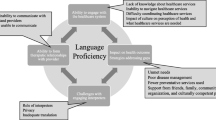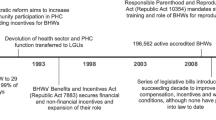Abstract
Background: Labrador’s Innu and Inuit live in nine small, isolated villages, and must travel to the urban centres of Goose Bay, Labrador and/or St. John’s, Newfoundland for most health services. This study responds to anecdotal evidence of Aboriginal dissatisfaction with these services from the St. John’s Native Friendship Centre Association (SJNFCA); it describes Aboriginal experiences and identifies relevant needs.
Methods: The study consisted of qualitative interviews (N=143), conducted by trained local researchers, and nine focus groups. The interviews were narrative-based, appropriate to the Aboriginal culture of participants. Participants were recruited from the client list of the SJNFCA.
Findings: Almost all study participants experience significant difficulties including profound disorientation, language and communication difficulties, inadequate accommodations, and altered diets. Cross-cultural relations are particularly problematic for the Innu.
Conclusions: These findings, and 19 recommendations made to the provincial government (8 main recommendations appear in Table II), could lead to improved services for Innu and Inuit using urban health services. Workshops in development could mean more awareness among health care practitioners.
Résumé
Contexte: Les habitants innus et inuits de neuf petits villages isolés du Labrador doivent se rendre dans les centres urbains de Goose Bay, Labrador ou St. John’s (Terre-Neuve) pour obtenir la plupart des services de santé. En réponse à des rapports non scientifiques de la Native Friendship Centre Association (SJNFCA) de St. John’s faisant état d’une insatisfaction des Autochtones à l’égard des services reçus, nous avons voulu décrire l’expérience des Autochtones en matière de santé et définir leurs besoins.
Méthode: L’étude a compris des entretiens qualitatifs (N=143) menés par des chercheurs locaux spécialisés auprès de neuf groupes. Il s’agissait d’entretiens narratifs adaptés à la culture autochtone des participants. Ceux-ci ont été recrutés parmi la clientèle de la SJNFCA.
Résultats: Presque tous les participants vivaient des difficultés importantes durant leurs séjours en ville, notamment une désorientation extrême, des problèmes de langue, de communication et d’hébergement et des changements à leur régime alimentaire. Les relations transculturelles étaient particulièrement difficiles pour les Innus.
Conclusions: Ces résultats et nos 19 recommandations au gouvernement provincial (les 8 principales figurent au tableau II) devraient favoriser l’amélioration des services de santé dispensés aux Innus et aux Inuits en milieu urbain. Des ateliers sur le développement pourraient sensibiliser les professionnels de la santé.
Similar content being viewed by others
References
Baikie M, Murray C. Referral of patients from northern Labrador. Arctic Medical Research 1991;Supp:82–85.
O’Neil JD, Koolage WW, Kaufert JM. Health communication problems in Canadian Inuit communities. Circumpolar Health 1988;47:374–78.
Wilson R, Krefting L, Sutcliffe P, Van Bussel L. Native Canadians relocating for renal dialysis. Can Fam Phys 1994;40:1934–41.
Cruikshank J. The Social Life of Stories: Narrative and Knowledge in Yukon Territory. Lincoln: University of Nebraska Press, 1994.
Newfoundland Statistics Agency, Government of Newfoundland and Labrador.
Brooks J. Australia hopes new strategy will improve health services for Aboriginal population. CMAJ 1995;152(9):1509–11.
Whalen DS. Cultural sensitivity: A matter of respect. Can Nurse 1999;95(9):43–44.
Morgan DL, Slade MD, Morgan CA. Aboriginal philosophy and its impact on health care outcomes. Aust N Z J Public Health 1996;21(6):597–601.
Lieberman L, Stoller EP, Burg MA. Women’s health care: Cross cultural encounters within the medical system. J Florida Med Assoc 1997;85(6):364–73.
O’Connor BB. Healing Traditions: Alternative Medicine and the Health Professions. Philadelphia: University of Pennsylvania Press, 1995;195.
Omeri A, Ahern M. Utilizing culturally congruent strategies to enhance recruitment and retention of Australian indigenous nursing students. J Transcultural Nursing 1999;10(2):150–55.
Whitmore RG, Postl BD, Garro LC. Strategies for involving native people in the operation and control of health services. Circumpolar Health 1988;47(Supp.1):350–53.
Author information
Authors and Affiliations
Corresponding author
Rights and permissions
About this article
Cite this article
Hanrahan, M.C. Identifying the Needs of Innu and Inuit Patients in Urban Health Settings in Newfoundland and Labrador. Can J Public Health 93, 149–152 (2002). https://doi.org/10.1007/BF03404558
Received:
Accepted:
Published:
Issue Date:
DOI: https://doi.org/10.1007/BF03404558




